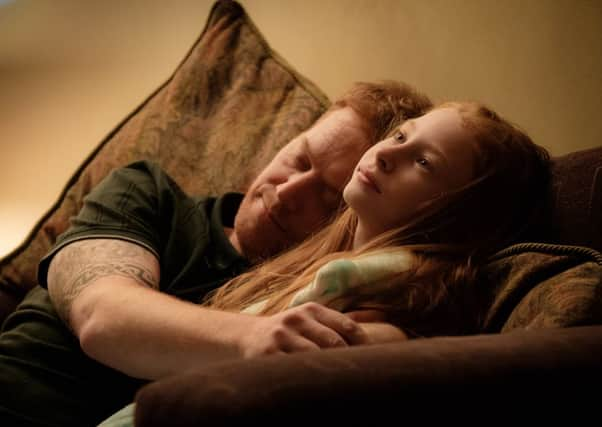Film reviews: Sorry We Missed You | After the Wedding | Terminator: Dark Fate | Yves Saint Laurent: The Last Collections


Revolving around a life-long grafter trying to take control of his future by buying into the gig- economy promise of just rewards for the self-motivated, Sorry We Missed You sees Ken Loach railing against austerity Britain with another typically impassioned, typically blunt, typically one-dimensional diatribe against a system that repeatedly pushes good people to breaking point.
Kris Hitchens takes the lead as Ricky, a proud family man who convinces his professional carer wife, Abbie (Debbie Haywood), to sell the car she needs for her job so he can buy a van and become a delivery driver for one of the numerous private courier companies that have sprung up in the wake of the tech-fuelled shift towards e-commerce.
Advertisement
Hide AdLoach and regular screenwriter Paul Laverty aren’t particularly interested in making connections between that cultural shift and the post-2008 economic downturn; nor do they hint at the complex, pro-Brexit reality of the film’s working class Newcastle setting (a missed opportunity, surely, for such a state-of-the-nation howl of despair). Instead they drill down into the minutiae of Ricky’s increasingly itemised existence to explore the knock-on effect it has on his already stretched-thin family.
The way Ricky’s digitally tracked day requires him to work with what amounts to a scanner-gun pressed against his head is certainly a potent symbol of the ruthlessness of a system that doesn’t even factor in basic rights like bathroom breaks – and Abbie’s sudden reliance on public transport to do her job further diminishes her own sense of worth, making her working day longer and robbing her of time with their kids, both of whom are responding to the increased tensions in the home in ways that highlight the emotional toll this kind of zero-hours contract work can take on everyone.
But while there’s no arguing with the basic message and good intentions of the film, it’s also borderline unwatchable. The vérité flair that once gave Loach’s work a radical cinematic charge has long since been replaced with a functional televisual flatness, one that complements the frequently soapy plotting, but also makes it impossible to tune out the cloth-eared dialogue, the simplistic salt-of-the-earth characterisation, the groaning symbolism (check the shot of the three-legged dog) or the am-dram awkwardness of some of the performances. A functional remake of Danish filmmaker Susanne Bier’s Oscar-nominated melodrama of the same name, After the Wedding switches the genders of the main characters to provide an acting showcase for Julianne Moore and Michelle Williams to play off each other as two women connected by a complicated family secret.
The Dickensian nature of that secret is preposterous, but the fallout from the revelation allows both actors to do some interesting work, with Williams’ idealistic aid worker forced to reckon with her past as Moore’s wealthy media company owner tries to engineer a secure future for her own family.
That sounds more cryptic than it really is, but the plot twists are worth preserving if only for the value of seeing the unexpected way these performers’ characters respond to them.
Given 2015’s Terminator Genisys attempted to perform a retroactive abortion on James Cameron’s first two movies by eliminating them from the timeline, one can hardly blame Cameron from responding in kind. As co-writer and producer of Terminator: Dark Fate, his return to the series he birthed wipes everything that happened post-T2 from the canon with a plot that rejoins Linda Hamilton’s Sarah Connor 20 years after she stopped Judgment Day.
Advertisement
Hide AdSadly, after a brilliant opening sequence, the film soon reveals that she hasn’t been able to stop other artificial intelligence companies from condemning the human race to a Terminator-filled future, which is all the excuse director Tim Miller (Deadpool) needs to remix the first two movies, albeit this time in Mexico and with a more racially and gender diverse cast.
Sadly, that cast has been given the fuzzy end of the lollipop – no one more so than Hamilton. Her centrality to the success of the first two films may finally be getting its due, but her big re-entry is like something out of Team America: World Police – it’s so corny and cliché-ridden it becomes parodic, not iconic. That’s not helped by the contrived way she’s been brought back, a plot point that also brings back Schwarzenegger, whose Terminator has – I kid you not – been living a quiet life running a drape-making business, which feels oddly appropriate. Instead of this being a glorious swansong, this really does feels like curtains for the once-great science fiction saga.
Advertisement
Hide AdShot almost two decades ago and then suppressed by one of its subjects, Yves Saint Laurent: The Last Collections offers an intimate portrait of the reclusive couturier and his testy relationship with his hard-nosed business partner Pierre Bergé, who blocked the film after its first public screening at the Berlin Film Festival in 2007.
Now slightly tweaked by its director Olivier Meyrou, the film, while not revealing anything especially scandalous, is clearly not the legend burnishing portrait the controlling Bergé had in mind.
As such there’s a certain pleasure to be had in watching this delicate deconstruction of the mighty fashion house. ■